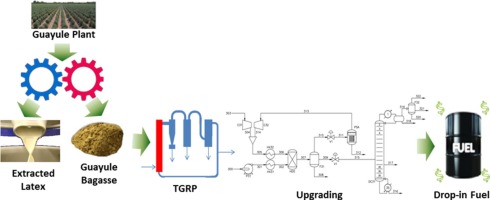Industrial Crops and Products ( IF 5.6 ) Pub Date : 2017-11-10 , DOI: 10.1016/j.indcrop.2017.11.009 Priscila S. Sabaini , Akwasi A. Boateng , Mark Schaffer , Charles A. Mullen , Yaseen Elkasabi , Colleen M. McMahan , Nelson Macken

|
The tire industry is currently considering natural rubber from guayule (Parthenium argentatum Gray) as a viable alternative to imported Hevea natural rubber, or petroleum-based synthetics, to meet expanding materials needs of the industry. However, only 5–10% of the harvested guayule plant is converted into rubber latex. For economic sustainability, the industry must identify viable uses for the balance residual, termed bagasse. Bioenergy production has been considered, but conversion facilities must be co-located to avoid additional costs in transportation of the bagasse. This study investigated the economics of processing a minimum of 200 metric ton per day (MTPD) of guayule bagasse to produce biofuels in a biorefinery co-located with a guayule latex processing facility. A unique aspect of the simulated process was the use of the tail gas reactive pyrolysis (TGRP) technology that formulates an intermediate bio-oil with less oxygenates and therefore requires only mild upgrading to fuel products. This achieved a yield of 16.2%, distributed in the gasoline (9.7%), jet fuel (5.6%), and diesel (0.9%) carbon ranges. The capital cost was estimated at $58.74 million (MM), and the annual operating cost was estimated at $14.19 MM. A discounted cash flow rate of return (DCFROR) analysis was conducted to evaluate the economic feasibility based on a 30-year plant life and 10% internal rate of return. The minimum fuel selling price (MFSP) calculated was 1.88 $/L for gasoline, 1.84 $/L for jet fuel and 1.91 $/L for diesel fuel, clearly showing the limitations imposed by economies of scale of the current guayule bagasse availability. However, there is a potential to reduce the MFSP by increasing the facility capacity and utilizing the valuable co-products that accompany guayule pyrolysis biorefining. Sensitivity analysis indicates the MFSP of gasoline can be lowered to 0.96 $/L considering the most optimistic scenario, comprising an integrated large facility of 2000 MTPD, lower cost of hydrogen, and the sale of a premium-quality residual guayule biorefinery coke.
中文翻译:

guayule(Parthenium argentatum)热解生物精制的技术经济分析:通过尾气反应性热解法从guayule蔗渣中生产生物燃料
轮胎行业目前正在考虑使用愈创木脂(Parthenium argentatum Gray)生产的天然橡胶。)作为进口的三叶胶天然橡胶或石油基合成材料的可行替代品,以满足行业不断增长的材料需求。但是,只有5–10%的番石榴树植物被转化为橡胶胶乳。为了实现经济可持续性,该行业必须为剩余的剩余物(甘蔗渣)确定可行的用途。已经考虑了生物能源的生产,但是必须将转换设备放置在同一地点,以避免蔗渣运输中的额外费用。这项研究调查了在与番石榴汁乳胶加工设施共置一处的生物精炼厂中,每天处理至少200吨番石榴汁蔗渣(MTPD)来生产生物燃料的经济性。模拟过程的一个独特方面是使用了尾气反应热解(TGRP)技术,该技术配制了一种含氧量较少的中间生物油,因此仅需要轻度地升级为燃料产品即可。这样实现了16.2%的产率,分布在汽油(9.7%),喷气燃料(5.6%)和柴油(0.9%)的碳范围内。资本成本估计为5874万美元,年度运营成本估计为14.19美元。进行了折现现金流量收益率(DCFROR)分析,以基于30年的工厂寿命和10%的内部收益率评估经济可行性。计算出的最低燃料销售价格(MFSP)为汽油1.88 $ / L,喷气燃料1.84 $ / L,柴油1.91 $ / L,清楚地显示了目前的愈创木瓜蔗渣供应量的规模经济所带来的限制。但是,有可能通过增加设施容量并利用愈创木瓜热解生物精制过程中利用有价值的副产物来降低MFSP。敏感性分析表明,考虑到最乐观的情况,汽油的MFSP可以降低至0.96美元/升,其中包括集成的2000 MTPD大型设施,较低的氢气成本以及出售优质的残留的愈创木瓜生物炼制焦炭。































 京公网安备 11010802027423号
京公网安备 11010802027423号